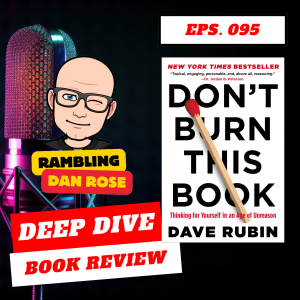Rambling Dan Rose Deep Dive Book Reviews
Dive into the world of insights and ideas with Rambling Dan Rose Deep Dive Book Reviews! We explore a wide range of topics through thoughtful, in-depth book reviews, offering inspiration, learning, and engaging conversations. Whether you’re here to expand your perspective or enjoy meaningful discussions, our content is crafted to inform and entertain. Join us as we unpack valuable insights on today’s most compelling subjects. Don’t forget to like and subscribe for updates on new content—thanks for stopping by!
Episodes

Thursday Dec 12, 2024
Thursday Dec 12, 2024
Our review today is from Peter Schweizer's "Profiles in Corruption," which examines alleged abuses of power and corruption among prominent progressive politicians in the United States. The author argues that progressives' advocacy for expanding federal power creates increased opportunities for such abuses. His book details various alleged instances of corruption involving financial gain, leveraging political influence for personal benefit, and preferential treatment for family and associates. The book uses case studies of several politicians to illustrate these claims.
We use AI to help create our podcast episodes, generating voices and initial scripts. We carefully craft each episode through specific prompting and editing to ensure it offers helpful, accurate insights based on books we've read or books recommended by our listeners. AI allows us to produce consistent, high-quality content more efficiently and frequently so we can focus on delivering valuable discussions to you.
We recognize that everyone will hold their own opinions about the books, authors, and topics we explore in our reviews. Our goal is to provide diverse opinions and viewpoints that contribute to a critical study of the issues being discussed.
Have a book you'd like us to review in our unique podcast style? Drop us a comment, and we’ll check it out!

Thursday Dec 12, 2024
Thursday Dec 12, 2024
Today, we review Michael Shellenberger's San Fransicko, which critiques of progressive policies in West Coast cities, arguing they have exacerbated homelessness and drug addiction crises. His book examines the failures of approaches like Housing First and decriminalization, contrasting them with more effective strategies employed in other cities. Shellenberger explores the roles of political ideologies, activist groups, and flawed government programs in creating and perpetuating these problems. He also analyzes the impacts of deinstitutionalization of the mentally ill and the unintended consequences of well-intentioned progressive policies. Ultimately, the book advocates for a balanced approach combining compassion with accountability to address these complex societal issues.
We use AI to help create our podcast episodes, generating voices and initial scripts. We carefully craft each episode through specific prompting and editing to ensure it offers helpful, accurate insights based on books we've read or books recommended by our listeners. AI allows us to produce consistent, high-quality content more efficiently and frequently so we can focus on delivering valuable discussions to you.
We recognize that everyone will hold their own opinions about the books, authors, and topics we explore in our reviews. Our goal is to provide diverse opinions and viewpoints that contribute to a critical study of the issues being discussed.
Have a book you'd like us to review in our unique podcast style? Drop us a comment, and we’ll check it out!

Wednesday Dec 11, 2024
Wednesday Dec 11, 2024
In today's Deep Dive book review, we look at Brian Stelter's Network of Lies, which examines Fox News's role in spreading misinformation and conspiracy theories, particularly concerning the 2020 election and the January 6th Capitol riot. Stelter’s book details the network's relationship with Donald Trump, highlighting how Fox amplified his false claims and contributed to the political climate leading to the riot. Stelter analyzes the consequences of this misinformation, including the Dominion Voting Systems lawsuit against Fox and the fallout from Tucker Carlson's dismissal. The book explores the internal dynamics of Fox News, the Murdoch family's influence, and the broader impact on American democracy. Ultimately, the book argues that Fox's actions fostered distrust in institutions and exacerbated political polarization.
We use AI to help create our podcast episodes, generating voices and initial scripts. We carefully craft each episode through specific prompting and editing to ensure it offers helpful, accurate insights based on books we've read or books recommended by our listeners. AI allows us to produce consistent, high-quality content more efficiently and frequently so we can focus on delivering valuable discussions to you.
We recognize that everyone will hold their own opinions about the books, authors, and topics we explore in our reviews. Our goal is to provide diverse opinions and viewpoints that contribute to a critical study of the issues being discussed.
Have a book you'd like us to review in our unique podcast style? Drop us a comment, and we’ll check it out!

Wednesday Dec 11, 2024
Wednesday Dec 11, 2024
Ben Shapiro's The Authoritarian Moment argues that the American left has weaponized institutions against dissent. Shapiro contends that left-wing authoritarianism, marked by top-down censorship and anti-conventionalism, is increasingly prevalent in academia, media, corporations, and even science. He examines how this has marginalized conservative and traditional liberal voices, facilitated by renormalization and the manipulation of social media. The book alleges that this authoritarian left seeks to silence opposing viewpoints and enforce ideological homogeneity, ultimately threatening American democracy. Shapiro concludes by suggesting a strategy of resistance through intransigence and a renewed commitment to individual liberty.
We use AI to help create our podcast episodes, generating voices and initial scripts. We carefully craft each episode through specific prompting and editing to ensure it offers helpful, accurate insights based on books we've read or books recommended by our listeners. AI allows us to produce consistent, high-quality content more efficiently and frequently so we can focus on delivering valuable discussions to you.
We recognize that everyone will hold their own opinions about the books, authors, and topics we explore in our reviews. Our goal is to provide diverse opinions and viewpoints that contribute to a critical study of the issues being discussed.
Have a book you'd like us to review in our unique podcast style? Drop us a comment, and we’ll check it out!

Tuesday Dec 10, 2024
Tuesday Dec 10, 2024
Today, we review Piers Morgan's Wake Up, which offers a commentary on contemporary societal issues. Morgan critiques what he perceives as the excesses of "woke" culture, arguing that its illiberal tendencies foster division and stifle free speech. He examines various controversies, including debates surrounding veganism, cancel culture, and transgender issues in sports. He contrasts this with what he sees as positive aspects of society, such as advancements in global health and technology while expressing concern over political polarization. The book ultimately advocates for a return to more tolerant and open discourse.
We use AI to help create our podcast episodes, generating voices and initial scripts. We carefully craft each episode through specific prompting and editing to ensure it offers helpful, accurate insights based on books we've read or books recommended by our listeners. AI allows us to produce consistent, high-quality content more efficiently and frequently so we can focus on delivering valuable discussions to you.
We recognize that everyone will hold their own opinions about the books, authors, and topics we explore in our reviews. Our goal is to provide diverse opinions and viewpoints that contribute to a critical study of the issues being discussed.
Have a book you'd like us to review in our unique podcast style? Drop us a comment, and we’ll check it out!

Tuesday Dec 10, 2024
Tuesday Dec 10, 2024
Our review today is from Nicholas Mulder's The Economic Weapon, which examines the history of economic sanctions, tracing their evolution from a tool of total war in World War I to a purported alternative to war in the interwar period and beyond. The book analyzes the League of Nations' attempts to utilize sanctions for collective security, highlighting both their potential and limitations, particularly in the face of rising global tensions and the Great Depression. Mulder explores the diverse perspectives on sanctions, from those who viewed them as a powerful peace-keeping instrument to those who critiqued their devastating humanitarian consequences. The book also considers the role of sanctions in shaping the economic policies of aggressor states like Germany and Italy and their eventual impact on the post-World War II international order. Finally, the author explores the evolving relationship between economic sanctions, war, and the development of international institutions.
We use AI to help create our podcast episodes, generating voices and initial scripts. We carefully craft each episode through specific prompting and editing to ensure it offers helpful, accurate insights based on books we've read or books recommended by our listeners. AI allows us to produce consistent, high-quality content more efficiently and frequently so we can focus on delivering valuable discussions to you.
We recognize that everyone will hold their own opinions about the books, authors, and topics we explore in our reviews. Our goal is to provide diverse opinions and viewpoints that contribute to a critical study of the issues being discussed.
Have a book you'd like us to review in our unique podcast style? Drop us a comment, and we’ll check it out!

Tuesday Dec 10, 2024
Tuesday Dec 10, 2024
Today we review Why Leader's Lie by John Mearsheimer. In his book, Mearsheimer explores the phenomenon of lying in international politics, challenging the common assumption that such deception is rampant. The author examines various types of lies, including inter-state lies, fearmongering, and strategic cover-ups, analyzing their strategic logic and potential consequences. He uses historical examples, particularly focusing on the Iraq War, to illustrate these types of deception. The book also considers the ethical dimensions of lying in international relations and assesses the potential domestic and foreign policy costs associated with each type of lie. Ultimately, Mearsheimer aims to provide a framework for understanding why and when leaders choose to lie in the international arena and the implications of such actions.
We use AI to help create our podcast episodes, generating voices and initial scripts. We carefully craft each episode through specific prompting and editing to ensure it offers helpful, accurate insights based on books we've read or books recommended by our listeners. AI allows us to produce consistent, high-quality content more efficiently and frequently so we can focus on delivering valuable discussions to you.
We recognize that everyone will hold their own opinions about the books, authors, and topics we explore in our reviews. Our goal is to provide diverse opinions and viewpoints that contribute to a critical study of the issues being discussed.
Have a book you'd like us to review in our unique podcast style? Drop us a comment, and we’ll check it out!

Monday Dec 09, 2024
Monday Dec 09, 2024
Our review today is of Michael Mandelbaum's The Four Ages of American Foreign Policy, which examines the evolution of US foreign policy, dividing it into four distinct eras: weak power (1765-1815), great power (1865-1945), superpower (1945-1991), and hyperpower (1991-2015). The book analyzes key events within each period, such as the American Revolution, the Mexican-American War, the Cold War, and the War on Terror, highlighting the shifting geopolitical dynamics and the interplay of ideology and national interests that shaped US foreign policy decisions. The book explores how domestic factors, like public opinion and economic systems, influenced foreign policy choices and outcomes. Finally, it reflects on the successes and failures of American foreign policy across these different phases.
We use AI to help create our podcast episodes, generating voices and initial scripts. We carefully craft each episode through specific prompting and editing to ensure it offers helpful, accurate insights based on books we've read or books recommended by our listeners. AI allows us to produce consistent, high-quality content more efficiently and frequently so we can focus on delivering valuable discussions to you.
We recognize that everyone will hold their own opinions about the books, authors, and topics we explore in our reviews. Our goal is to provide diverse opinions and viewpoints that contribute to a critical study of the issues being discussed.
Have a book you'd like us to review in our unique podcast style? Drop us a comment, and we’ll check it out!

Monday Dec 09, 2024
Monday Dec 09, 2024
Today's review is of Dave Rubin's Don't Burn This Book, which recounts his political evolution from a progressive to a classical liberal. Rubin details his experiences with cancel culture, the limitations of identity politics, and the perceived failings of the mainstream media. Rubin advocates for free speech, individual liberty, and classical liberal principles, contrasting them with what he sees as the excesses of modern progressivism. He uses anecdotes and statistics to support his arguments, highlighting his personal transformation and offering a guide to independent thought. His book also features endorsements from prominent figures like Peter Thiel and Tucker Carlson.
We use AI to help create our podcast episodes, generating voices and initial scripts. We carefully craft each episode through specific prompting and editing to ensure it offers helpful, accurate insights based on books we've read or books recommended by our listeners. AI allows us to produce consistent, high-quality content more efficiently and frequently so we can focus on delivering valuable discussions to you.
We recognize that everyone will hold their own opinions about the books, authors, and topics we explore in our reviews. Our goal is to provide diverse opinions and viewpoints that contribute to a critical study of the issues being discussed.
Have a book you'd like us to review in our unique podcast style? Drop us a comment, and we’ll check it out!

Monday Dec 09, 2024
Monday Dec 09, 2024
Today, we review Whittaker Chambers's Witness, a memoir detailing his experiences as an American communist and Soviet spy, including his recruitment of government officials like Alger Hiss. The book illustrates Chambers's internal conflicts, his motivations for defecting, and his interactions with various figures within the communist network. It also covers the aftermath of his defection, including the Hiss trials and subsequent controversies. The book reveals Chambers's complex personality, his intense commitment to communism and, later, anti-communism, and the profound impact of these experiences on his life. Finally, the book includes lists of names, hinting at the vast network of communist influence.
We use AI to help create our podcast episodes, generating voices and initial scripts. We carefully craft each episode through specific prompting and editing to ensure it offers helpful, accurate insights based on books we've read or books recommended by our listeners. AI allows us to produce consistent, high-quality content more efficiently and frequently so we can focus on delivering valuable discussions to you.
We recognize that everyone will hold their own opinions about the books, authors, and topics we explore in our reviews. Our goal is to provide diverse opinions and viewpoints that contribute to a critical study of the issues being discussed.
Have a book you'd like us to review in our unique podcast style? Drop us a comment, and we’ll check it out!






